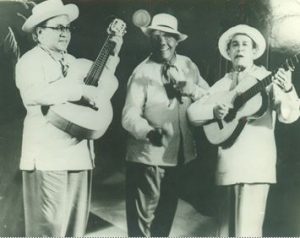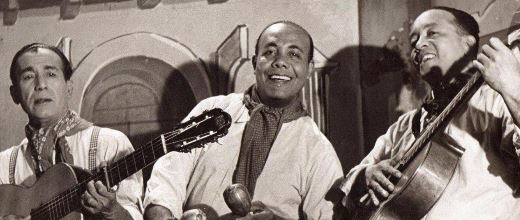This post is also available in:
 Español
Español
That evening, the nightclub was full of patrons. Miguel Matamoros was excited in anticipation of what could be a defining evening in his career.
Yet he remained calm and collected, as he always does when he’s about to perform. He felt the rush of adrenaline that makes most people nervous when about to perform in public, but somehow, it had a soothing effect on him. He approached his friends and colleagues Rafael and Siro just before stepping on stage.
“Rafa, Siro; I don’t know if Mr. Terry will show up or not. But let’s forget about him and the audition. The people that came here tonight will be our audition. Let’s play for them.” He then added, “The other guys will show up in about 30 minutes. By the time we go up with the septet, we’ll have the crowd all fired up.” said Miguel confidently. “Let’s go guys”, he added hurriedly, as he led the way to the small stage.
As the Trio Oriental took the stage, the patrons gave them a courtesy applause as most of them were getting their drinks or settled into their tables. Miguel thanked them and glanced at the crowd as he finished tuning his guitar. He noticed that Mr. Terry wasn’t there. To break the ice, Matamors decided to start with “Mujer Celosa”, a soft “son” he had written in his typical style with trova-like verses and melody.
As they played “Mujer Celosa”, Matamoros noticed the arrival of Mr. Terry’s group. They were hard to miss, as the three of them moved across the tables and joined another guy in one of the tables in front of the dance floor. Miguel assumed that one of Mr. Terry’s partners must have arrived early to hold the table for them, a fact that elevated Miguel’s confidence.
With the crowd warmed up, Miguel followed his plan to play some of his favorite “boleros” with the trio. He led Rafael and Siro into “Juramento”, followed by “Promesa”. These were songs which were part of their regular repertoire, and highlighted the harmony of the voices of Siro and Miguel. He also chose to play them because they hadn’t played neither of them at the hotel audition earlier that day, so they would be new for Mr. Terry.
After the three songs, Miguel paused to address the audience. He greeted the patrons and then pointed out that he wrote the next bolero, “Santiaguera”, for the beautiful women in the city. This got them a second applause from the crowd, especially the men, who barely outnumbered the women. During the set, the dance floor remained just as full with couples dancing “boleros” as it did for dancing “son”.
At this point in the set, Miguel sensed that the patrons were ready for something faster. He was planning to provide them plenty of “son” with the septet in the next set. So instead, he picked a “bolero-son” he had written recently called “El Consejo” as their next song. it starts as a “bolero” and then transitions into a soft “son” at the end, which would serve to accelerate the heartbeat of the dancers just a bit before the septet took the stage after the break.
As they finished the song, Miguel was about to announce that they would take a short break, when he noticed that many of the couples weren’t leaving the dance floor. The dancers didn’t want to lose their places in the small dance floor in order to keep a spot to dance the next song. Miguel, who was good to react to the feedback he perceived from the audience, changed plans on the fly and announced they would play one more song before taking a short break. This served to prepare the crowd for the break while giving them one more chance to dance before bringing up the Septeto Oriental on the next set.

So with that, the Trio Oriental finished the set with “Olvido”, a bolero which had become one of the favorites with Santiagueros. It was usually rewarded with a big applause every time they played it. So Miguel was betting on a set-ending double play, as the song would both please the crowd as well as hopefully impress Mr. Terry.
The small ovation that followed the song had not ended as the Trio Matamoros walked off-stage for a short break. Miguel, Rafa, and Siro were all smiles, feeling as triumphant gold-medal athletes getting off the podium.
“We’re doing great guys”, Miguel told his two colleagues, stating what was already obvious to them. From the small corner between the stage and the end of the bar where the musicians normally gathered, Matamoros kept an eye on Mr. Terry’s table. The crowd reaction to the songs, particularly to “Olvido” , had Mr. Terry talking cheerfully to this partners.
“I bet Mr. Terry liked this much more than our hotel audition” added Siro, looking at Miguel who didn’t take his eyes off Mr. Terry’s table.
“..and when he hears us play “son” with the septet, he’ll be paying our drinks.” added Rafael.
Miguel turned around to face his friends, “..and talking about drinks, let’s finish these and get back on stage.”, he added. “We don’t want to keep Mr. Terry waiting and let the crowd cool down”.
The trio took the last sip from their drinks, put down their glasses at the bar, and headed for the stage. The other guys were waiting for them on-stage. To complete the Septeto Oriental, Matamoros added Manuel Bogella (tres), Agerico Santiago (clarinet & trumpet), Francisco Portela (bass), and Manuel Poveda (timbales). After a few quick tuning accords to get all seven of them in the same note, Miguel started the set with a “son” that was a crowd favorite.
As soon as they began playing the first notes of “Son de la Loma”, several couples immediately got up to dance. The small dance floor filled almost instantly. Located between the small stage and the first row of tables, it was barely 6 x 8 feet. It didn’t take that many couples to fill it up. Other couples danced in the side halls or in any space available around the bar. Others sang along from their stables or the bar in the smoky and semi-dark club.
“Santiagueros” love their “son“. They dance it with elegance, with their bodies so close to each other and moving in such synchronicity that it gives the illusion of one person dancing with their own shadow. With the crowded dancefloor, the scene resembled a garden full of tulips swayed back and forth by the wind.
The locals had developed a liking for Matamoros music. They liked the rhythmically different style of “son” he played, with tinges of “trova” in both the music and the lyrics. But what made Miguel’s songs particularly sticky was you could easily relate to them. Instead of writing songs from a 3rd person point of view, describing a scene as a narrator, he preferred to write from a 1st person point of view, where he tells the story as he experienced it.
“Mom, I want to know, from where are the singers,
..which I find them gallant, and I want to know them,
…with their fascinating ‘trovas’, which I want to learn.”
Mr. Terry could hardly see the band playing from his front table, but he enjoyed the festive atmosphere in the club. He stayed for a couple more songs before the pale, hefty New Yorker put on his hat and left the nightclub quietly.
When the Septeto Oriental finished their set, the dance floor emptied and Miguel could see Mr. Terry’s table again. He was surprised to see other people sitting at what had been Mr. Terry’s table. Still standing in the small stage, he tried to find Mr. Terry and his partners from there, looking around the club, but he couldn’t find them. With the dancefloor practically full all the time during the set, Miguel lost sight of Mr. Terry’s table from the stage. Additionally, he had gotten so immersed in the music, that he almost forgot all about Mr. Terry during the set.
As he walked off the stage towards their little corner near the bar, Matamoros didn’t know what to make of Mr. Terry’s silent exit. Until a second ago, Miguel had felt the exciting feeling of electrifying the crowd with his music. It felt in heaven by being able to trigger people’s emotions with his songs. Nothing would be better than being able to leave his day job and make a living doing this, just like the Sexteto Habanero guys.
Now, as if someone had pinched his balloon and let all the air out, he felt disappointed. All the work and preparation they had done these last three years had suddenly vanished in a second. At this moment, Miguel wasn’t as disappointed of not getting the recording contract, as he was about Mr. Terry not having the courtesy of telling him directly that he wasn’t going to record them.
For a few seconds, Miguel felt alone in the crowed club. He stared blankly towards the nightclub door, wondering if his dream of recording his music had disappeared with Mr. Terry.


[…] Chapter 1: The Audition Chapter 2: Second Chance Chapter 3: Renaming The […]